Nexera UC - Features
Supercritical Fluid Extraction / Supercritical Fluid Chromatograph
Higher resolution
Improved separation and detection capabilities result from the low viscosity and high diffusion coefficient of Supercritical CO2. As shown below, Nexera UC demonstrates high-separation selectivity for isomeric compounds that are difficult to separate by conventional HPLC.
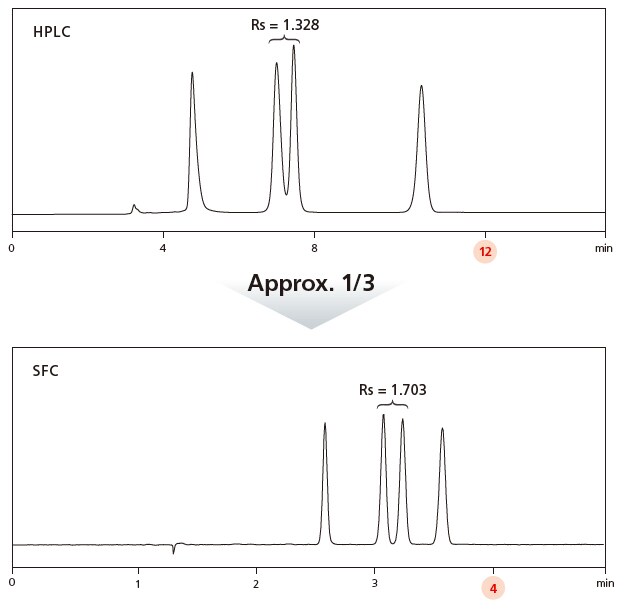
Comparison of separation acquired by Conventional HPLC and SFC
Ideal for simultaneous analysis of compounds with a wide range of polarities
SFC can achieve a wide variety of separation patterns. This allows comprehensive analysis of compounds over a wide polarity range not previously possible with HPLC. Different separation methods are generally used for fatty acids, which are typically analyzed by GC, and glycerides, which are typically analyzed by HPLC. However, because supercritical carbon dioxide has properties similar to hexane, SFC is well-suited for analyzing compounds with different polarity, providing an ideal solution for the simultaneous analysis of fatty acids and glycerides.
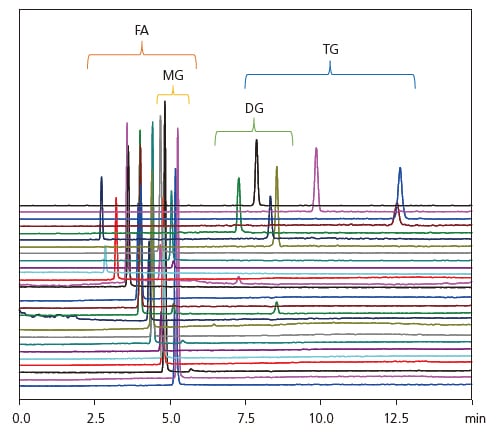
Simultaneous analysis of fatty acids and glycerides by SFC
Sensitivity results from different separation modes in HPLC vs SFC
Supercritical CO2 has unique properties different from liquid. Using SFC in front of a mass spectrometer offers greater sensitivity than achieved with LC/MS/MS.

Comparison of peak intensity detected by LC/MSMS and SFC/MS/MS.
(Sample: Prostagrandin D2 10 pg)
Automatically performs a variety of method scouting processes
The high-speed performance of SFC can shorten the time required for method scouting. The system automatically generates a large number of methods by utilizing combinations of up to 12 columns, four modifiers, and different ratios of modifiers to mobile phase. With UHPLC/SFC Switching system, screening by UHPLC and SFC can be carried out in the same batch. Moreover, Method Scouting Solution, optional software for method scouting, makes it easy to set up multiple conditions.
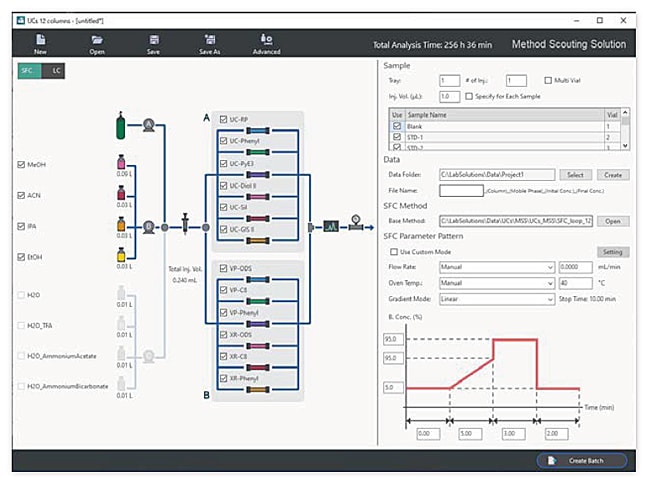
A screen shot of Method Scouting Solution for Nexera UC user interface.
Chiral analysis with Nexera UC Chiral Screening System
CHIRALPAK® Series and CHIRALCEL® Series columns (Daicel Corporation) for chiral analysis are capable of resolving a wide variety of compounds by showing complementary separation targets. The combination of the Nexera UC Chiral Screening System and these columns simplifies method scouting for chiral analysis.
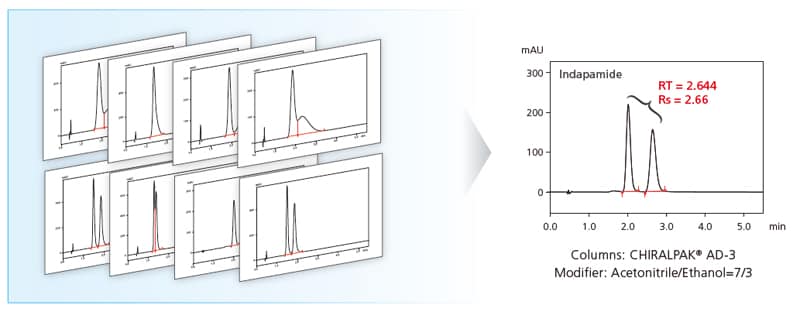
Available for both UHPLC and SFC analysis using a single system : Nexera UC/s
Various methods are needed to separate chiral compounds, structural isomers, and other such substances in all sorts of fields, such as pharmaceuticals, foods, and environmental testing. Because supercritical fluid chromatography (SFC), which uses supercritical CO2 as a mobile phase, exhibits different separation behavior than ultra high performance liquid chromatography (UHPLC), superior separation results can be quickly obtained during method development by screening with both SFC and UHPLC separation methods.

Using the System for Chiral Analysis
In this example, methods were scouted for two types of chiral standard samples using both SFC and UHPLC. UHPLC and SFC parameter settings in the method scouting software can be specified by clicking a button to switch between modes.

A comparison of SFC/UHPLC chromatograms using three different columns indicated that UHPLC parameters provided better separation for omeprazole and SFC parameters provided better separation for imdapamide. LabSolutions software makes it easy to compare chromatograms from multiple sets of data.
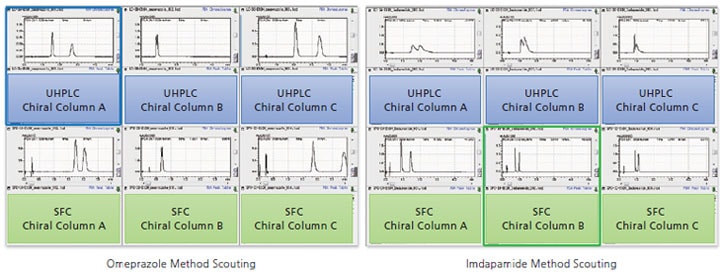
Small volume fractionation
Upgrade to Analytical Fraction System
By adding a fraction collector to the analytical scale SFC, small-volume fractionation is also possible. A complete workflow can be carried out seamlessly on one system, from method development to fractionation.
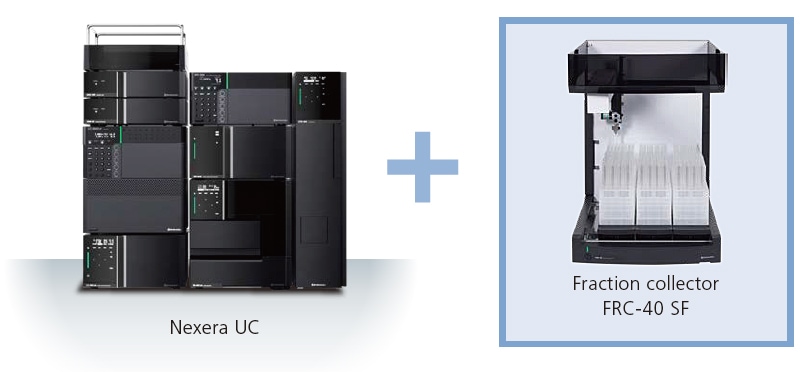
In preparative SFC, one factor that results in lower recovery rates is increased scattering of the eluent when the CO2 returns from a supercritical to a gaseous state. The Nexera UC Prep’s patented gas-liquid separator, the LotusStream™ separator, successfully reduces sample dispersion and carryover, while also achieving high recovery rates. It allows fractionation of small volumes, even into vessels such as 1.5 mL vials. The optical isomers of linalool were fractionated with high purity.
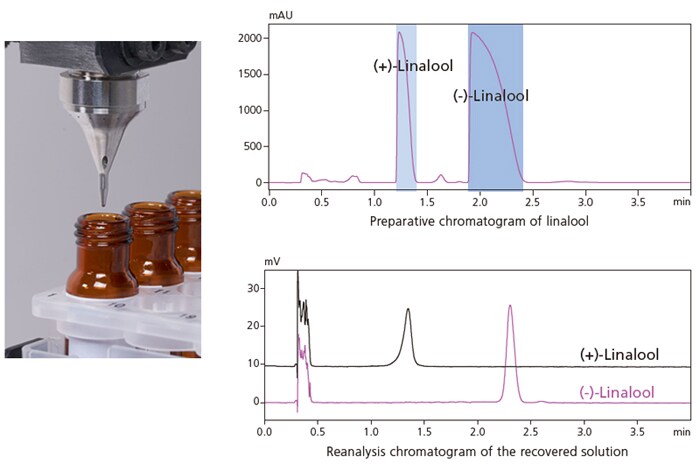
Fully automated on-line extraction and separation
Nexera UC on-line SFE-SFC is a revolutionary system that combines on-line supercritical fluid extraction (SFE) and SFC in a single flow path (patented technology). Target compounds are extracted from solid samples and then automatically transferred to SFC analytical system so that no human intervention is required. The Nexera UC on-line SFE-SFC system reduces the time for pretreatment of samples and acquires highly accurate data. In addition, off-line SFE can simplify pretreatment over existing solvent extraction methods.
Comparison of QuEChERS sample preparation and Nexera UC in the analysis of residual pesticides
A typical sample preparation takes 35 minutes and requires several manual steps. With Nexera UC, the same sample can be ready for on-line SFE/SFC analysis in as little as five minutes with only a few simple sample preparation steps.
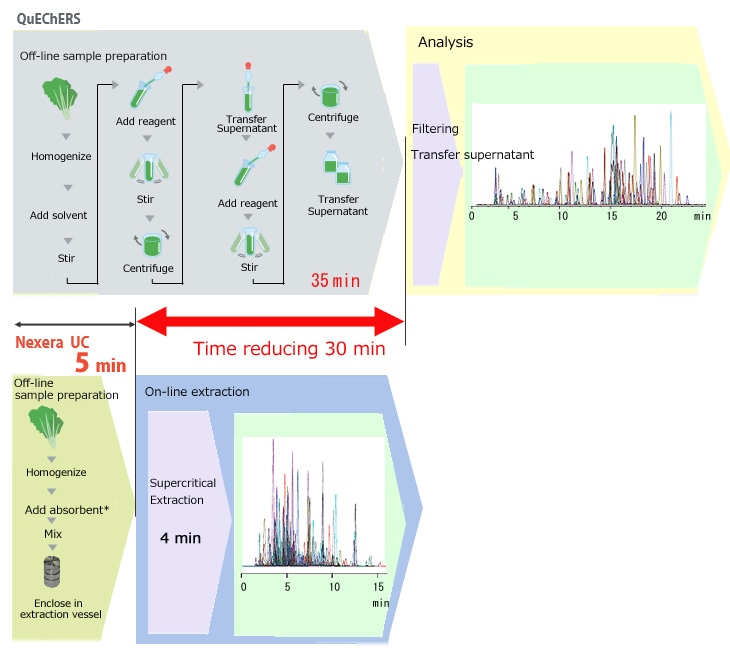
* "Miyazaki Hydro-Protect", Patented in Japan No.3645552
Customized modules for Nexera UC based on Nexera technology
Supercritical Fluid Extraction Unit SFE-30A
This unit operates at a maximum temperature of 80℃ to allow faster and more complete extractions. Five types of extraction vessels (two sizes (5 mL, 0.2 mL)made of PEEK(maximum pressure 20MPa), three sizes (10 mL, 5 mL, 0.2 mL) made of SUS) can be chosen based on the sample and sample amount.

CO2 Solvent Delivery Unit LC-30ADSF / Back Pressure Regulator Unit SFC-30A
Stable baseline with low pulsation is realized by LC-30ADSF with a built-in cooler for pump heads, which delivers mobile phases up to 5 mL/min at pressures up to 66 MPa. The low dead volume of SFC-30A (0.7 μL) allows a mass spectrometer to be directly connected to the SFC system without splitting so that higher sensitivity can be achieved.
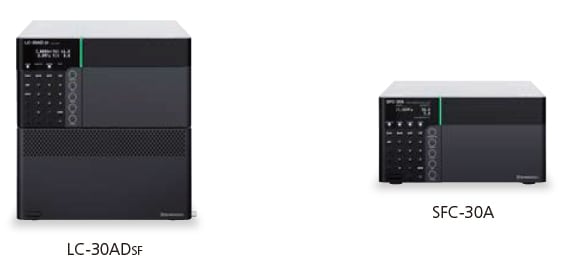
Nexera UC reduces environmental impact
Comparison of costs and consumption of organic solvent for a single analysis by conventional normal-phase HPLC vs. SFC is shown below. By using SFC, the total cost of analysis is reduced by 87.6% and the consumption of organic solvent is reduced by 94.2%.



